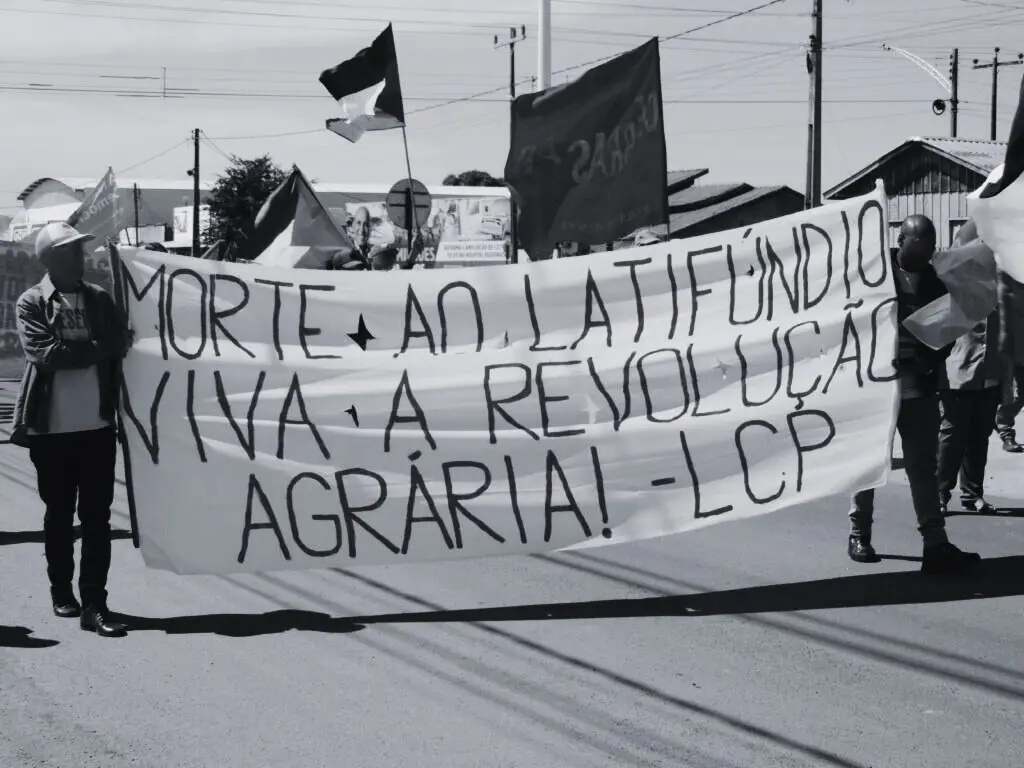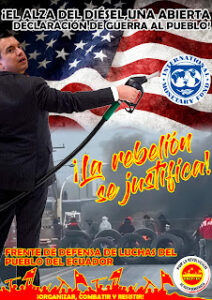
AND Editorial – Pyrrhic Victory for the Old Bourgeois Democracy
League of the Poor Peasants marching on the 30th Anniversary of the Battle of Santa Elina in Rondonia.
We hereby share an unofficial translation of A Nova Democracia (AND)’s latest editorial.
The conviction of Bolsonaro and the other seven charged of the so-called “crucial nucleus” composed of his far-right supporters, confirmed almost unanimously by the First Panel of the Supreme Federal Court (STF), came as no surprise. Constructed to appear as a true “settling of scores” between the “democrats” and the “fascists,” the trial and judgment, despite the harsh penalties imposed on the convicted, are nothing more than a grand spectacle. In fact, in the struggle between the far right for a military regime and the old bourgeois democracy, neither side identifies with the popular masses and their most basic interests. Therefore, neither of them expresses true democracy; on the one hand, there are the defenders of a military regime and, on the other, the defenders of a “Democratic State of Law” whose maintenance must be ensured by the adoption of any and all reactionary measures corresponding to its bourgeois nature, for which it even uses the far right itself as a watchdog to achieve their implementation. In fact, both poles are in opposition within the same tendency toward fascism.
Although revolutionaries and democrats should always take advantage of the contradictions between the far right and the traditional right to advance the democratic gains of the people, and isolate their most reactionary elements, the benefit to be gained does not go beyond that. Democratic freedoms, incidentally, which are still very restricted in this centuries-old system of exploitation and oppression, are exclusive achievements of the popular revolutionary struggle on the ground, and both the laws of this system and its institutions are, in fact, a brake on their expansion. Therefore, in the course of the trial, it was not the defense of those democratic freedoms that the STF did, but rather the opposite: The entire trial in this case and its ruling create the pretexts and justifications as precedents for treating the popular revolutionary struggle as an “attempt to abolish the democratic rule of law,” since the masses in struggle also “coerce institutions” into yielding to their pressures and, in certain circumstances, also have an organization that drives them in this. Tomorrow, the popular struggle will be attacked with the same weapons that are now being used against the far right: if we must not show any solidarity with the “green chickens” [Translator’s note: followers for the Bolsonaro] because their aims and objectives are to defend this same system of exploitation and oppression, neither should we show any “enthusiasm” for the conviction of the “captain of the bush” [Translator’s note: reference to Jair Bolsonaro]. Brazil, regardless of the outcome of the trial, is moving closer to a reactionary regime across the board. Bolsonaro’s conviction does not make Brazil more democratic.
The conviction was portrayed by the media monopolies as a “historic event” through which (bourgeois) democracy is reinvigorated: nothing could be further from the truth. Coupism, whether that of the Bolsonarism or that of the Armed Forces High Command (ACFA), has after the trial: on one hand, Bolsonarism has not lost any of its electoral political strength, and with the conviction of its leader, with a third of the voting population still holding him in high regard, it is the spoils of votes disputed by so-called presidential candidates from the right and far right; on the other hand, the ACFA, using the former as cannon fodder, remains on the lookout for a better opportunity. This alone is sufficient to demonstrate the failure of such a “path” to combat the reaction. These factors force the candidates to succeed Bolsonarism to assume their extremist discourse and, in fact, to practice it: another figure will head this movement, albeit temporarily, at least from an electoral point of view. The conditions that produced Bolsonarism continue and are worsening: it is the deep crisis of this system of bureaucratic capitalism, of its State apparatus, and of its discredit in the eyes of the revolting masses. In this context, with the support of the most powerful core of the ruling classes of big bourgeoisie and big landlords, servants of imperialism, mainly Yankee imperialism, Mr. Tarcísio de Freitas emerges, while Ronaldo Caiado runs on the outside, or rather, in the interior (Midwest and North, especially the region of agricultural frontier expansion). Whatever the outcome, there is no doubt that the focus of his proposals will be an apparently rational policy in relation to Congress, and an increase in the low-intensity war against the struggle for land and the urban poor, from increased police and military repression and emergency laws to the cover-up and protection of paramilitary groups that exterminate the poor.
As we have seen, this trial did not touch on the ACFA, which gave rise to the current military and institutional crisis. None of the right-wing generals who, while not Bolsonaro supporters, are or have proven to be notorious coup plotters, such as Hamilton Mourão, Eduardo Villas-Bôas, and many others, were included in the charges brought by the Attorney General’s Office (PGR). Throughout the trial, the reactionary armed forces received fawning comments from the “excellencies” of the STF, who stopped just short of licking their boots on national television. These gentlemen forgot that, according to the much-touted law that punishes coups d’état, it is a crime to “attempt to coerce, restrict, or impede” the “constituted powers”: in terms of the effectiveness of this crime in practice, Bolsonaro is a child compared to Villas-Bôas. It was the former who, in 2018, through an explicit interventionist threat, coerced Minister Rosa Weber’s vote in the Habeas Corpus trial of Luiz Inácio, blatantly altering her vote, the result of which removed him from the electoral race. This fact, which, together with other conspiratorial acts, ultimately guaranteed Bolsonaro’s election in 2018, is it or is it not coercion, a restriction of the powers that be? And Mr. Hamilton Mourão: when he went to the Freemasons and explicitly threatened the official political world and the nation with a coup d’état “in extreme cases,” which would happen if his instructions were not obeyed, wasn’t that coercion, a restriction of powers? Thus, although such a judgment places a certain legal barrier to the right-wing extremist disruption of the established order, it nevertheless endorses the legality, by omission, of the institutional path to a military coup d’état.
If, on the one hand, it is true that no trial can prevent a breakdown of constitutional order, because this is achieved through the use of weapons and in spite of the law, on the other hand it is also true that the far right emerges from this process with less room for maneuver to justify such a measure; coupism, however, for these and other reasons, is not weakened in the same way. It is a Pyrrhic victory against Bolsonaro’s coup-mongering.
The exception was the vote of Mr. Minister Luiz Fux, who recommended the acquittal of all the coup generals of all the crimes they were charged with. Presented as a “guarantor” – someone who defends constitutional guarantees and rejects punitive measures on principle – it is curious that he has only done so now. We will see if the distinguished minister will continue with his guarantor outburst when, in the courts, it is not the “green chickens” but the social fighters, the revolutionaries, who are on trial. Moreover, his bourgeois formalist argument, unscrupulously comparing the Bolsonaro coup attempt of January 8, 2023, to the June 2013 protests, borders on insanity: there is an unfathomable gulf between the latter — an authentically popular movement, legitimately based on popular dissatisfaction and which, in essence, sought to expand democratic rights through its actions, even though there are those who may question its developments and direction — and the former, an event involving the manipulation of masses, planned in detail within the barracks and with the approval of the presidential cabinet.
The backdrop to this entire institutional and military crisis can be found in class struggle and not exclusively in palace disputes. Throughout Bolsonaro’s term, the far right has fought to reestablish the fascist military regime, firmly believing that the country’s economic and social situation—with endemic economic crisis and the almost complete demoralization of the political system in the eyes of the masses—produced a dangerous inflammatory ground that could be exploited by the revolutionary popular struggle. Bolsonaro and ACFA’s terror is violent popular rebellions and, above all, as he made a point of mentioning on two occasions, the revolutionary peasant struggle for land and its organizations. Not without reason, on 1st of May, 2021, he named the League of the Poor Peasants (LCP) as a “guerrilla hotbed” and “terrorism worse than the MST (Landless Workers’ Movement),” “which begins in the countryside and will surely reach the city.” A month later, in a speech during the inauguration of the bridge over the Madeira River, connecting Rondônia to Acre on Highway 364, he threatened: “LCP, get ready: what you are doing will not go unpunished.” In fact, the far right, the rabid attack dog of the latifundium, the big bourgeoisie, and imperialism, saw in the confluence of economic, political, social, and institutional crises and the rise of the revolutionary struggle for land a combination that would justify a rupture. For their part, the right-wing generals, who were not Bolsonaro supporters but who oversaw his government, with the same concern, warned of the need to act within the limits of constitutionality, through its gradual dismantling, without creating a fuss or greater instability in society, in order to combat the “danger of revolution,” as retired army colonel Fernando Montenegro recently stated on social media, accusing the LCP of being a “criminal organization” that is moving from the guerrilla preparation phase to guerrilla warfare for “subversion” in the country.
The coup d’état openly advocated by Bolsonaro to reestablish the military regime and the step-by-step approach recommended by ACFA are two sides of the same counterrevolutionary offensive aimed at preventing popular rebellions, unleashed after the uprisings of 2013/14 and reinforced by “Operation Car Wash” with the immediate goal of fulfilling the three reactionary tasks demanded of it by imperialism, in order to try to overcome the deep crisis of the system of domination by promoting bureaucratic capitalism, imposing maximum centralization of power in the executive branch, and averting the danger of revolution in the country, the latter task requiring them to combat by all means the revolutionary struggle for land, the Agrarian Revolution. Therefore, victory in this phase of the counterrevolutionary offensive belongs to none other than the poor peasants and the true democrats and revolutionaries.
***
White House spokeswoman Karoline Leavitt fired off that the ultra-reactionary Donald Trump “is not afraid to use economic or military means,” and, using Bolsonaro’s trial in the Supreme Court and the coup generals as a pretext, concluded that it would be “to protect freedom of expression around the world.” At the end of Bolsonaro’s trial, Trump said he was “surprised” by the outcome and made new threats. In our tribune, we have already analyzed that such bravado from Yankee imperialism, in relation to the national political situation, only serves to deepen the semi-colonial condition of the country and the nation, throwing all this “support” for Bolsonaro to the wind once it achieves its goal. Nevertheless, they have a simultaneous objective in the context of the intensification of the class struggle at the international level and the uneven development of the revolutionary situation throughout the world, namely: to intervene in a scenario of increasing anti-imperialist struggle, national liberation wars, and the fight against ongoing and impending People’s Wars. They “advised” classifying paramilitary organizations (read: the complex and lucrative network of drug trafficking and other activities closely linked to the old State and its institutions, from which imperialism actually benefits) under the label of “narco-terrorists,” which, in practice, allows the Yankees to intervene militarily in foreign territories at will, under the authority of the now renamed Department of War, in violation of international law and the laws of the invaded country. This is also how we should interpret the fact that a few days ago a Yankee CIA plane carried out a secret mission in Porto Alegre and São Paulo without the Brazilian government’s authorization and with its total and cowardly servile silence.
Neither direct attacks and provocations against the nation nor the deployment of troops to the coast of Venezuela, in flagrant military aggression against a country that shares strategic borders with Brazil, are enough to make Brazil’s old and rotten official institutions speak out forcefully against US interventionism. On the contrary, they trade in national sovereignty, limiting themselves to “defending” it with demagogic slogans and empty rhetoric, as seen in the official celebration of September 7 (false national independence) in Brasilia and others organized by the false opportunistic left in other capitals, such as Rio de Janeiro and São Paulo; They defend “sovereignty” in order to sell it in the most convenient and profitable way to the financial oligarchies and to the latifundium.

